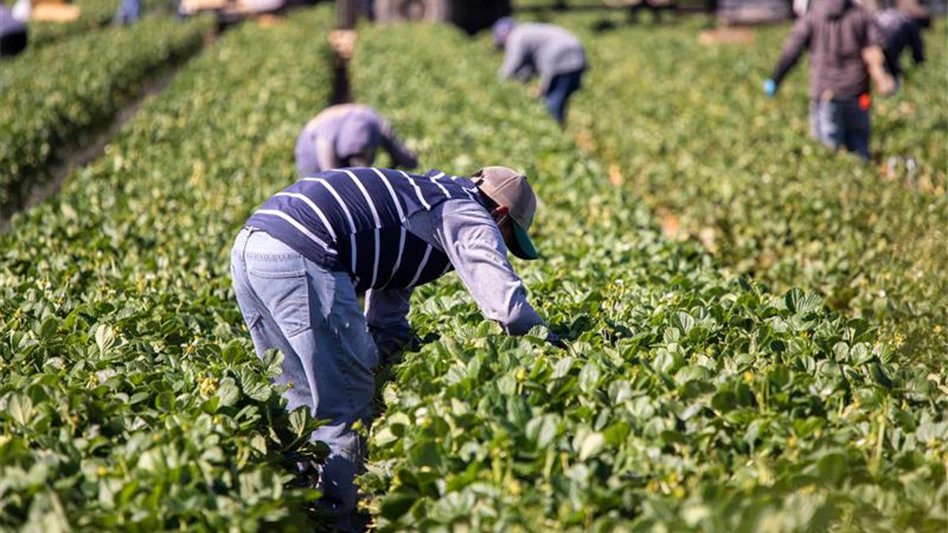
Photo © F Armstrong Photo/Adobestock
The International Fresh Produce Association and nine co-plaintiffs have filed a lawsuit contesting the U.S. Department of Labor’s recent rule giving temporary farmworkers in the U.S. through the H-2A visa program collective bargaining rights.
The plaintiffs — which include AmericanHort, the U.S. Chamber of Commerce and the American Farm Bureau Federation — say the DOL’s recently finalized H-2A rule represents unconstitutional regulatory overreach and limits the freedom of speech of farmers who employ temporary workers.
The lawsuit argues that the DOL’s recently finalized H-2A rule, already blocked from being enforced in 17 states, illegally gives temporary agriculture workers collective bargaining rights, restricts the First Amendment rights of farmers who employ H-2A workers, and creates additional burdens for employers and state governments.
The plaintiffs believe these actions will harm the American agriculture industry, according to a press release from the plaintiffs.
“DOL is exacerbating an already enormously challenging labor crisis for growers and agriculture employers across the country. This lawsuit challenges the unauthorized process through which DOL passed this rule and the unlawful and unconstitutional impacts it has on American agriculture employers,” said IFPA CEO Cathy Burns. “Our industry is dedicated to providing fresh, healthy foods that nourish the world, but without certainty in the H-2A program, which provides farmers access to qualified, valued foreign workers and, likewise, gives those workers the ability to legally work in the United States, it is much harder for us to grow and harvest the fresh fruit and vegetables consumers want and expect throughout the year.”
The lawsuit, filed Oct. 8 in the Southern District of Mississippi with representation from McDermott, Will & Emery, requests a permanent injunction of the DOL rule, titled “Improving Protections for Workers in Temporary Agricultural Employment in the United States.”
Department of Labor rule on H-2A workers
H-2A workers are temporary, nonimmigrant workers lawfully admitted to the U.S. under the Immigration and Nationality Act (INA) to perform temporary or seasonal agricultural labor or services, per the U.S. Department of Labor.
The Farmworker Protection Final Rule, announced in April and enacted in June, provides strengthened worker protections in the H-2A program to help ensure the H-2A program doesn't have an adverse effect on the working conditions of similarly employed workers in the U.S.
The department said that workers employed under the H-2A program can face unique risks of exploitation, due to the temporary nature of the work, frequent geographic isolation and dependence on a single employer for housing, transportation and immigration status, as well as risks of human trafficking, unsafe transportation and retaliation.
For workers not protected by the National Labor Relations Act, the rule would protect workers engaging in self-organization or concerted activities, according to the DOL. The NLRA grants those protections to most other private-sector employees, but not farmworkers, according to an article from Reuters.
The final rule strengthens protections for temporary agricultural workers by making several changes to H-2A program regulations to bolster the department's efforts to prevent adverse effects on workers in the U.S. and ensure that H-2A workers are employed only when there are not sufficient able, willing and qualified U.S. workers available to perform the work, according to the DOL.
DOL rule is currently blocked in 17 states
In August, a federal judge in Georgia in the case Kansas v. U.S. Department of Labor — a similar case in the 11th Circuit brought by 17 state attorneys general, agricultural trade group the Georgia Fruit and Vegetable Growers Association and Miles Berry Farm in Georgia — found the rule unconstitutional and blocked the Biden administration from enforcing it within the 17 Republican-led states pending the outcome of their lawsuit filed in June, the same month the rule went into effect, Reuters reports.
The 17 states in which the rule cannot be enforced are Georgia, Kansas, South Carolina, Arkansas, Florida, Idaho, Indiana, Iowa, Louisiana, Missouri, Montana, Nebraska, North Dakota, Oklahoma, Tennessee, Texas and Virginia. It also can’t be enforced against Miles Berry Farm and the members of the Georgia Fruit and Vegetable Growers Association.
U.S. District Judge Lisa Wood in Brunswick, Georgia, ruled the DOL rule is invalid because Congress explicitly excluded farmworkers from such protections when it granted them to other private-sector workers in the National Labor Relations Act, according to Reuters.
According to GPB, a Georgia news outlet, at the center of the plaintiff’s argument is that the Department of Labor shouldn’t have the regulatory power to change decades of policy, power they defer to Congress. The states in their lawsuit say Congress never gave the DOL the power to grant organizing rights to H-2A workers, according to Reuters.
Wood agreed, writing that "...by implementing the Final Rule, the DOL has exceeded the general authority constitutionally afforded to agencies. ... The DOL may assist Congress, but may not become Congress.”
That ruling bolsters the plaintiffs’ position in the Mississippi case, as they point out employers in the agriculture industry must abide by different regulations and meet different requirements depending solely on the states in which they are located.
“The DOL rule represents a regulatory overreach that ignores both legislative and judicial precedent. It imposes serious limitations on farm employers’ abilities to run their businesses while erecting barriers for those same employers to communicate with their employees,” said Ken Fisher, president and CEO of AmericanHort, in a press release. “Our members depend on a reliable, legal workforce, and they deserve access to the H-2A program without facing excessive costs and red tape.”
DOL finds violations in 90% of investigations of agricultural employers
The DOL investigated 240 suspected violations of labor laws by agricultural employers in eight states and found violations in 90% of those investigations, the Atlanta Journal Constitution reports.
Employers in the Southeast region where investigations were conducted are increasingly relying on the H-2A program. Last fiscal year, a high of 37,536 temporary guest workers from Latin America crossed the border to legally come work in Georgia, according to the AJC.
Leticia Zavala grew up as a farm worker, and she’s been in the fields practically all her life. She started working with H-2A workers about 20 years ago. She explained that the North Carolina Growers Association used the H-2A program widely at that time.
The association “makes it easier for farmers to keep growing food in the United States by providing a stable, legal and reliable workforce,” according to the NC Growers Association’s website. The association continues to be the nation’s largest user of the agricultural “guest worker” program.
“Intimidation and fear are one of the reasons why employers like [the program] because it's very easy to intimidate and harass workers by threatening that they’re not going to come back next year,” former farm worker Zavala said. “Even workers asking about their wages and why they’re not working is seen as a retaliation by growers. … It’s bad.”
Zavala organizes H-2A workers in North Carolina with the farmworker-led nonprofit organization El Futuro Es Nuestro – It’s Our Future. She explained that the final rule from the DOL gives farmworkers more support to organize amongst themselves.
“When workers come from a different country and they don’t know the language, they rely on their employer for transportation, for housing, for work, and their immigration status is also controlled by their employer. They don't have anything but themselves,” Zavala said. “And if they can't organize amongst themselves, then that means they're not being treated as humans.”
According to the DOL, the revisions in the Farmworker Protection Final Rule will help “prevent exploitation and abuse of agricultural workers and ensure that unscrupulous employers do not financially gain from their violations or contribute to economic and workforce instability by circumventing the law. This would adversely affect the wages and working conditions of workers in the United States similarly employed and undermine the Department's ability to determine whether there are insufficient U.S. workers for proposed H-2A jobs.”
The final rule requires employers to provide assurances that they will not intimidate, threaten or otherwise discriminate against certain workers or others for engaging in “activities related to self-organization,” including “concerted activities for the purpose of mutual aid or protection relating to wages or working conditions” or refusing to engage in such activities. Such activities may include seeking to form, join or assist a labor organization, but it also encompasses numerous other ways that workers can engage, individually or collectively, to enforce their rights.
However, the plaintiffs argue in the lawsuit that the DOL cannot modify the rules without congressional oversight.
“This attempt by the federal government to slip labor unions onto American farms through the backdoor undermines farmers and threatens the very fabric of the American agricultural community,” said Mississippi Attorney General Lynn Fitch in a press release. “Not only has Congress not authorized this, it has specifically exempted farmworkers from collective bargaining laws.”
Zavala said H-2A workers feel like politicians are not interested in talking with them, as they're "not my constituent," she said.
“So, it makes it very difficult for farmworkers to have that access. A lot of them live here nine, 10 or 11 months harvesting crops, so this is more of their home than what they have in Mexico because they're not over there as much," Zavala said. "When we see rules like this, as basic as they may seem, it's a feeling of gratitude towards farmworkers because it means they're being recognized for who they are. I think this rule is more than just the changes that will happen and how it will improve conditions, but it’s the recognition that farmworkers are vital, and they're needed.”
Katie McDaniel is assistant editor of Nursery Management magazine. Contact her at kmcdaniel@gie.net.

Explore the December 2024 Issue
Check out more from this issue and find your next story to read.
Latest from Greenhouse Management
- Terra Nova releases new echinacea variety, 'Fringe Festival'
- AmericanHort expands greenhouse training with new Section Grower Certification
- Sakata Seed America celebrates renovation of Cal Poly greenhouse complex
- American Horticultural Society names winners of 2025 AHS Book Awards
- Nufarm announces unified brand
- American Horticultural Society announces winners of 2025 Great American Gardeners Awards
- What growers can learn from amateur plant scientists
- Green Guide: Monarda punctata





